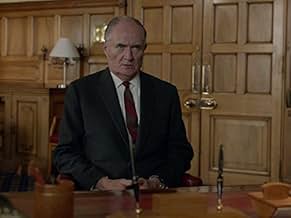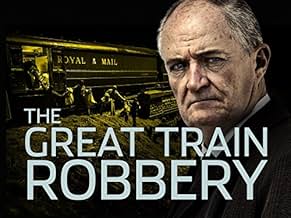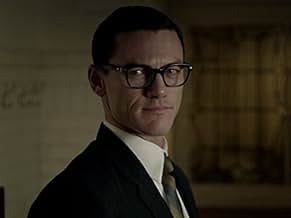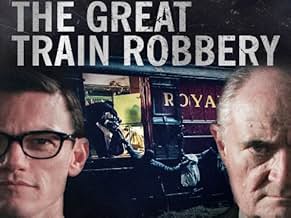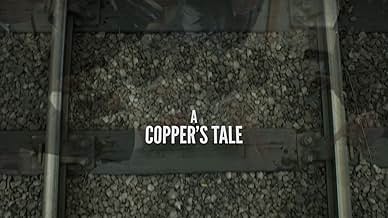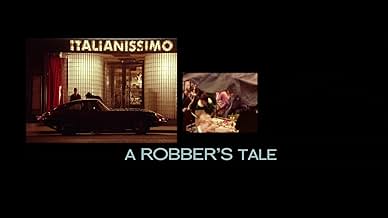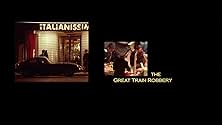Um drama dividido em duas partes que retrata O Grande Assalto ao Trem de 8 de agosto de 1963, primeiro do ponto de vista dos ladrões e depois do ponto de vista da polícia que partiu para ide... Ler tudoUm drama dividido em duas partes que retrata O Grande Assalto ao Trem de 8 de agosto de 1963, primeiro do ponto de vista dos ladrões e depois do ponto de vista da polícia que partiu para identificar e capturar os ladrões.Um drama dividido em duas partes que retrata O Grande Assalto ao Trem de 8 de agosto de 1963, primeiro do ponto de vista dos ladrões e depois do ponto de vista da polícia que partiu para identificar e capturar os ladrões.
- Indicado para 1 prêmio BAFTA
- 4 indicações no total
Explorar episódios
Avaliações em destaque
At the time, the Great Train Robbery was the biggest theft in British criminal history and was as much a part of 1963 here as the Profumo Scandal and the emergence of the Beatles. With the fiftieth anniversary of significant events in that year being commemorated right left and centre (the making of the first Beatles album, the first Dr Who TV show, of course the Kennedy assassination), I guess this notorious occurrence was also too big to miss.
With a large cast consisting of some of the best of British male acting talent (female characters hardly get a look-in), painstakingly accurate set design not to mention the actual train itself, the component parts were all there and waiting to be assembled into place. The imaginative decision to break it into two films, the first part concerning the planning and execution of the crime itself and focusing on the criminal gangs which came together to do the misdeed, the second, the aftermath, concentrating on the police investigation run by Jim Broadbent's tough-as-old-boots D.I Tommy Butler, was, on paper, a good one and for the first half certainly successful.
In part one, we see the scheme being formulated by Luke Fisher's bespectacled (obviously marking him out as the brains) Bruce Reynolds the coordinator of the operation, including the recruitment of the necessary personnel, implementation of the crime and the plan on how to escape the law after the robbery. Pacily directed and well-acted by the whole group, the viewer is completely taken into the criminal world and despite myself, caught up in the anticipation and even excitement as they set about their dirty work. I must admit my distaste at the scene where they realise the enormity of what they've done and celebrate with abandon, even though I knew they didn't get away with it for long.
Which leads onto part two, which I felt was altogether less successful. The narrative changes tack and now follows the police investigation into the crime with Broadbent and his weary men one by one picking off the assembled pictures of the perpetrators on their incident-room notice board. Unfortunately at this point the director decides that Broadbent and his team are the UK equivalent of The Untouchables so that we get endless shots of Broadbent grimly gazing at the camera and when they walk, it's in De Palma-esque slow-motion. All the artifice that was stripped away in the impressive first 90 minutes is overloaded into the second one and while there's still drama in watching all the villains get their come-uppance, you completely lose the sense of authenticity built up thus far. The soundtrack was confusing too, quite why 50's Frank Sinatra songs proliferate, I can't tell and for some reason the great Spencer Davis Group song "I'm A Man", cut in 1966 gets played as the background to events from three years before. The use of Nina Simone songs, especially "Sinner Man" did work better but again, like the overall production, they only got this part half-right too.
I almost thought that the two parts must have been directed by two different directors but no, it was just poor execution of a good plan, sort of like how the robbers handled their getaway.
With a large cast consisting of some of the best of British male acting talent (female characters hardly get a look-in), painstakingly accurate set design not to mention the actual train itself, the component parts were all there and waiting to be assembled into place. The imaginative decision to break it into two films, the first part concerning the planning and execution of the crime itself and focusing on the criminal gangs which came together to do the misdeed, the second, the aftermath, concentrating on the police investigation run by Jim Broadbent's tough-as-old-boots D.I Tommy Butler, was, on paper, a good one and for the first half certainly successful.
In part one, we see the scheme being formulated by Luke Fisher's bespectacled (obviously marking him out as the brains) Bruce Reynolds the coordinator of the operation, including the recruitment of the necessary personnel, implementation of the crime and the plan on how to escape the law after the robbery. Pacily directed and well-acted by the whole group, the viewer is completely taken into the criminal world and despite myself, caught up in the anticipation and even excitement as they set about their dirty work. I must admit my distaste at the scene where they realise the enormity of what they've done and celebrate with abandon, even though I knew they didn't get away with it for long.
Which leads onto part two, which I felt was altogether less successful. The narrative changes tack and now follows the police investigation into the crime with Broadbent and his weary men one by one picking off the assembled pictures of the perpetrators on their incident-room notice board. Unfortunately at this point the director decides that Broadbent and his team are the UK equivalent of The Untouchables so that we get endless shots of Broadbent grimly gazing at the camera and when they walk, it's in De Palma-esque slow-motion. All the artifice that was stripped away in the impressive first 90 minutes is overloaded into the second one and while there's still drama in watching all the villains get their come-uppance, you completely lose the sense of authenticity built up thus far. The soundtrack was confusing too, quite why 50's Frank Sinatra songs proliferate, I can't tell and for some reason the great Spencer Davis Group song "I'm A Man", cut in 1966 gets played as the background to events from three years before. The use of Nina Simone songs, especially "Sinner Man" did work better but again, like the overall production, they only got this part half-right too.
I almost thought that the two parts must have been directed by two different directors but no, it was just poor execution of a good plan, sort of like how the robbers handled their getaway.
This almost documentary style film made for interesting viewing, and this may have been Luke Evans' first leading role, and he grabbed the opportunity with lots of panache. As the leader of the band of robbers who pulled off the heist, I had some difficulty in focusing on who he was as Buster Edwards and Ron Biggs were always better known. The film however did show that this was a big gang of thieves, and this probably led to their undoing. The actual heist took up little screen time, the rest dealt with the dynamic between the gang, and the motivation of the ringleaders apart from the usual greed, is clearly shown. I enjoyed it, there was always the feeling that this was a gang who were in over their heads, and there is one telling moment when they realize it after counting the money.
The early sixties setting with its talk of the war years and exploits of that time is well realized, making this a series to be enjoyed. Martin Compston had a small but significant role as well.
The second instalment is just as fascinating when you are given the opportunity to see the trail of clues the gang left behind them in the old farmhouse, even after 'apparently' cleaning up! A restrained but driven Jim Broadbent gives the sense of urgency the Police felt about solving this crime, and it says much about the actors concerned, that you almost wanted the robbers to get away with it! Perhaps that explains the success of later series like Money Heist which focus on that.
The early sixties setting with its talk of the war years and exploits of that time is well realized, making this a series to be enjoyed. Martin Compston had a small but significant role as well.
The second instalment is just as fascinating when you are given the opportunity to see the trail of clues the gang left behind them in the old farmhouse, even after 'apparently' cleaning up! A restrained but driven Jim Broadbent gives the sense of urgency the Police felt about solving this crime, and it says much about the actors concerned, that you almost wanted the robbers to get away with it! Perhaps that explains the success of later series like Money Heist which focus on that.
Since the story based on real events is known, I expect the film to be a little more than a purely chronological sequence of the plot. In addition to Luke Evans, the actors are not very prominent and join the monotone pattern. The film could have been more, but in the end it is a boring TV production in my eyes. And after all two long
This two part drama was a retelling of the The Great Train of 1963. The first part was the Robbers Tale which was a straightforward story of the planning and execution of the robbery.
This was the most fascinating aspect of the drama as over the years, the personalities of some of the robbers (Ronnie Biggs, Buster Edwards) has overshadowed the events of the Train Robbery and the main players involved.
Luke Evans, Martin Compston and Paul Anderson give the best performances.
The second part was the Policeman's Tale and featured Jim Broadbent as DCS Butler, hell bent in getting the gang like the sheriff of an old wild west town which was very much how he was introduced.
This was more procedural and not as interesting or riveting as the first part.
Incidentally both parts had different directors but Butler was just too much of a dullard and Broadbent looks too old to even be playing a cop on the verge of retirement.
Able support by Robert Glenister. It is interesting to see that 'Slipper of the Yard' (played by Nick Moran) who in later years seemed to have been more prominent in the media as the cop hunting the train robbers was a more secondary character in this drama.
Well now Slipper is dead he will not be able to sue for his lack of prominence. In the past when he was alive he was rather quick to shout libel for any slight stain on his character!
This was the most fascinating aspect of the drama as over the years, the personalities of some of the robbers (Ronnie Biggs, Buster Edwards) has overshadowed the events of the Train Robbery and the main players involved.
Luke Evans, Martin Compston and Paul Anderson give the best performances.
The second part was the Policeman's Tale and featured Jim Broadbent as DCS Butler, hell bent in getting the gang like the sheriff of an old wild west town which was very much how he was introduced.
This was more procedural and not as interesting or riveting as the first part.
Incidentally both parts had different directors but Butler was just too much of a dullard and Broadbent looks too old to even be playing a cop on the verge of retirement.
Able support by Robert Glenister. It is interesting to see that 'Slipper of the Yard' (played by Nick Moran) who in later years seemed to have been more prominent in the media as the cop hunting the train robbers was a more secondary character in this drama.
Well now Slipper is dead he will not be able to sue for his lack of prominence. In the past when he was alive he was rather quick to shout libel for any slight stain on his character!
"The Great Train Robbery" is a miniseries in two parts. The first part focuses on mid-range crooks, led by Bruce Reynolds (Luke Evans) who decide to rob a train carrying a fortune in money. The second is about the police investigation and search for them.
I really enjoyed the first part, but the second part for me was a let- down. The criminals were more interesting than the police, led by DI Frank Williams (Robert Glenister) for some reason. And I sort of wanted them to get away with it. I'm sure that sounds terrible.
The acting is very good, and since it's based on a true story, it was interesting to see how the police picked up the trail of the crooks and to read at the end what happened to them.
I do recommend it, but you'll find the second part less compelling.
I really enjoyed the first part, but the second part for me was a let- down. The criminals were more interesting than the police, led by DI Frank Williams (Robert Glenister) for some reason. And I sort of wanted them to get away with it. I'm sure that sounds terrible.
The acting is very good, and since it's based on a true story, it was interesting to see how the police picked up the trail of the crooks and to read at the end what happened to them.
I do recommend it, but you'll find the second part less compelling.
Você sabia?
- CuriosidadesRonald Biggs, one of the last surviving Great Train Robbers, died on 18 December 2013, the same day that this two-part series was first shown.
- Erros de gravaçãoPolice Officers are shown wearing white shirts. In 1963 Constables and Sergeants in all English police forces wore blue shirts. The change to white shirts came in the late 1970s.
- ConexõesReferences O Primeiro Assalto de Trem (1978)
Principais escolhas
Faça login para avaliar e ver a lista de recomendações personalizadas
- How many seasons does The Great Train Robbery have?Fornecido pela Alexa
Detalhes
- Data de lançamento
- País de origem
- Central de atendimento oficial
- Idioma
- Também conhecido como
- 火車大劫案
- Locações de filme
- Empresas de produção
- Consulte mais créditos da empresa na IMDbPro
- Tempo de duração
- 1 h 30 min(90 min)
- Cor
Contribua para esta página
Sugerir uma alteração ou adicionar conteúdo ausente



